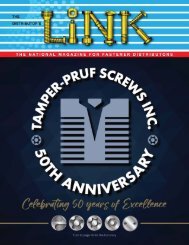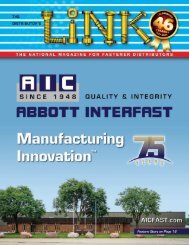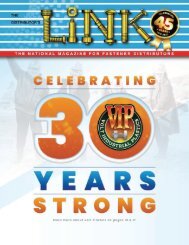SPRING 2011
Distributor's Link Magazine Spring Issue 2011 / VOL 34 / NO.2
Distributor's Link Magazine Spring Issue 2011 / VOL 34 / NO.2
You also want an ePaper? Increase the reach of your titles
YUMPU automatically turns print PDFs into web optimized ePapers that Google loves.
24 THE DISTRIBUTOR’S LINK<br />
Bart Basi<br />
Dr. Bart A. Basi is an expert on closely-held enterprises. He is an attorney, a<br />
Certified Public Accountant, and President of The Center for Financial, Legal &<br />
Tax Planning, Inc. He is a member of the American Bar Association’s Tax<br />
Committee on Closely-Held Businesses.<br />
SELLING STOCK VERSUS SELLING ASSETS<br />
AND THE TAX MINIMIZATION ANALYSIS<br />
Many business owners contemplate selling their<br />
businesses to start their retirement or to transition into<br />
another business. Many issues come to mind when<br />
considering selling a business. Among them are: how<br />
much is my business worth, who will buy it, and how<br />
much will I be left with once all of the taxes are paid?<br />
These valid considerations are extremely important when<br />
selling a business because the business owner is selling<br />
an asset that is worth as much or more than his or her<br />
house.<br />
What makes selling a business particularly<br />
difficult is the fact that business sales are<br />
nearly invisible in the market.<br />
Consider this, look down the block<br />
where you live and elsewhere.<br />
How many for sale signs do you<br />
see and how much would you<br />
expect each house you see to<br />
sell for? Typically, people<br />
have an excellent idea and knowledge<br />
of the information and tax consequences<br />
concerning buying and selling houses, cars,<br />
furniture, vacation properties, stocks, bonds, etc.<br />
However, buying and selling a business is a different<br />
story!<br />
Try the same action. Look at a business park or<br />
office building. How many businesses in the park or<br />
building are for sale and what would you expect to pay<br />
for the businesses. Chances are when you make this<br />
observation, you will not see one business for sale,<br />
know the selling price, how to arrive at a reasonable<br />
price, or what the tax consequences of the sale are.<br />
That is why it is important to thoroughly be aware of the<br />
consequences of the sale before selling a business.<br />
This article will discuss the tax consequences of<br />
selling a business. The tax aspects of selling a business<br />
are as important as the asking price of the business<br />
itself! Among the tax considerations, whether you sell<br />
stock or assets of the company is an important concept<br />
to know and be familiar with. As a rule asset sales<br />
generally tend to result in more tax while stock sales will<br />
usually result in fewer taxes due for the seller.<br />
Asset Sales<br />
Many sales of closely held businesses are<br />
asset sales. An asset sale, in this<br />
context, is a sale of a business<br />
by means of selling<br />
substantially all or all of the<br />
assets of the business.<br />
Assets include tangible<br />
and intangible, intellectual<br />
property, physical property,<br />
inventory, goodwill, real<br />
estate, land, equipment,<br />
furniture, fixtures, and anything else<br />
that would be considered to belong to the<br />
company.<br />
Asset sales, as mentioned above, tend to give<br />
rise to higher tax liabilities to the seller than selling<br />
the stock of the company. On the other hand, to<br />
the buyer, an asset sale means increased tax<br />
benefits. The buyer buys the assets at a higher<br />
basis than what he or she would buy in a stock<br />
sale. Since asset sales result in higher tax liability<br />
for the seller and enhanced tax benefits for the<br />
buyer, it is common practice for the seller to ask<br />
for a higher price to compensate for the higher<br />
taxes.<br />
Asset sales tend to<br />
give rise to higher tax<br />
liabilities to the seller than<br />
selling the stock of the<br />
company.<br />
please turn to page 124

















